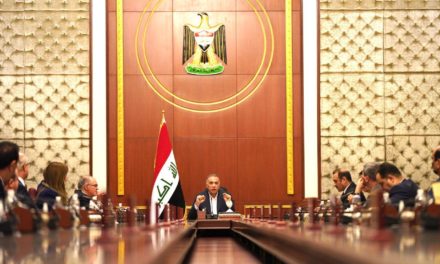(Photo: Mahdi Al-Saadawi/UNDP Iraq)
An estimated 48,000 people are still detained in the Syrian Al-Hol camp for displaced Da’ish supporters and families, the majority of whom are women and children. Extremist ideology associated with Da’ish is prevalent in the camp, which continues to pose a danger to Iraq and beyond. If there is no concerted effort to counter extremist thinking, we may face a new version of Da’ish, which could threaten not only Iraq and the region, but also Europe and the United States. Although Da’ish was territorially defeated in Iraq in December 2017, it remains active through sleeper cells. Iraq and its allies need to address the more imminent threat Al-Hol camp poses, as well as the longer-term danger of extremist ideology.
The diminished activity of Da’ish in Iraq since 2018 shows that the Iraqi government has succeeded in implementing the strategy to combat terrorism on the ground. Although Da’ish operations do not pose an existential threat as they once did, their ideology still poses a long-term threat. The Iraqi government needs a vision on how to do so beyond the prism of security operations, by focusing on preventing and combatting extremist ideology. Such a policy requires a holistic approach that combines several government institutions and programmes, beyond just the security services, which I explain below.
Developing an integrated military doctrine
Iraqi Security Forces suffered from unprofessionalism in the past, culminating in the collapse of several army divisions in Mosul in 2014. Fighting an enemy like Da’ish, which is ideologically determined and has the ability to fight with fervour and despite losses, it is imperative for the Iraqi Security Forces to develop an integrated military doctrine that combines professionalism with loyalty, patriotism, and sacrifice. Some of these characteristics were on display in the liberation campaign. This includes engagement with communities, how to use force selectively, and the importance of multi-layered security plans. These need to continue to be worked on beyond the Da’ish war.
Prioritising economic development
There is a direct relationship between economic development and security. Where there has been real economic development in areas that are considered terrorist incubators, it has ultimately led to a decline in the level of terrorist operations and an increase in the level of security. This policy rebuilds the mutual relationship between the citizen and the state, giving young people hope for a better future and opportunities to earn a livelihood. Experience has also shown us that the opposite is true; where there is poverty, marginalisation, and lack of economic opportunities, you also find an increase in extremist behaviour and recruiting. The local and federal governments have to use economic policies as their tools to prevent extremist behaviours from emerging. Relying solely on security policies will not be enough.
Building trust
Building peace in post-conflict societies is based on the necessity of building trust among societal actors through the idea of balance between those actors, which is essentially based on a policy of fair distribution of what the state possesses, whether material resources or even political positions. This leads to a reduction in extremist attitudes and hopefully a lasting peace. Once some trust is achieved, it is vital to train imams and mosque preachers on the idea of combating violent extremism through their religious platforms. Another step is to revise the curricula in schools and universities to adopt more inclusive ideas and remove hateful content that encourages marginalisation. Schools need to create an environment that builds active citizenship so that communities feel a national attachment and accept those who hold differing beliefs and backgrounds.
The priority of regional cooperation
It is vital for Iraq to build confidence in the idea that Iraq as a country is no longer a regional threat. This depends on preventing armed actors from engaging in regional crises under the auspices of the Iraqi state, specifically the Syrian and Yemeni crises. Iraq’s neighbours have viewed it with distrust for many years and have limited their security cooperation as a result. In some cases, they viewed the threats emerging from Iraq as critical and decided to adopt interventionist policies that increased violence and instability in Iraq. The Iraqi government needs to be fully in control of security and make sure no threats are evident to other nations. In return, this will lead to more cooperation with other countries who will become more helpful, avoid destabilising policies, and work with Iraq to improve its security environment.
The strategy to combat terrorism may be implemented by competent security services, while the strategy to combat extremism requires a governmental effort by all state institutions, whether purely military or specialized security, as well as civil institutions, specifically educational and cultural institutions. In addition to the necessity of integration, it is necessary for the fight against violent extremism to become a movement that includes the entire society in order to develop the resilience of communities and their ability to deter any extremism, meaning the empowering of society and demilitarisation. To confront extremism and fortify itself against extremist intellectual ideologies, the state cannot act alone, because combating terrorism requires tactical efforts, while combating extremism requires strategic efforts. Combating terrorism requires a proactive strategy, while combating extremism requires a preventive strategy.
In addition to the necessity of trying to move from combating extremism to preventing extremism by empowering society, any comprehensive plan to combat ideologies should include preventive measures aimed at preventing radicalism from spreading within society in the first place, as well as taking measures aimed at confronting the process of extremism that affects individuals when it occurs. This creates a state of effective balance and practical treatment between national security and societal cohesion, builds confidence among all concerned parties, confronts all forms of violent extremism that threaten society, and has a systematic potential for sustainability and expansion.
Just as there are institutions concerned with combating terrorism, such as the Counter-Terrorism Service, there are institutions concerned with combating extremism like the National Security Advisory, whose mission is primarily intellectual through interaction with all government institutions. In addition, educational institutions also need support. The strategy to combat terrorism, as well as the strategy to combat extremism, must rely on studies and research by academic institutions and through specialized researchers, who conduct field questionnaires and research teams, in cooperation with all government institutions to collect data in related sectors. Research can aid in how to formulate effective strategy, as well as reducing the biases and incorrect perceptions that security institutions may have adopted.
There are other practical solutions that government can undertake to prevent extremism from developing. These include building residential complexes inhabited by people from all components of society to create a state of community cohesion among citizens to achieve the desired state of citizenship that helps reduce extremism. Cultural heritage also plays an important role in helping Iraq’s society heal. Another is further unifying religious discourse among representatives of the religious components of Iraqi society to prevent hate speech. Lessons learned from other countries should also be studied closely so that Iraq can permanently recover from conflict and extremism.
This essay is part of a special series – Empowering Change in Iraq: Policy Recommendations for a New Era











